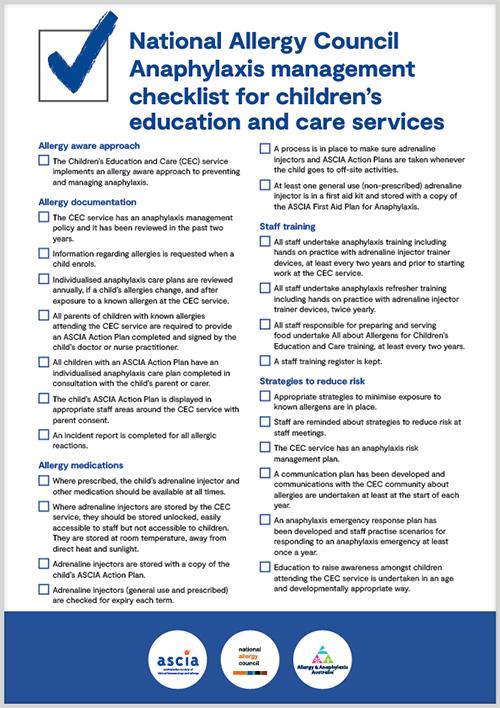- Home
- Children's education and care
- Anaphylaxis management checklist children’s education and care services
Anaphylaxis management checklist children’s education and care services
This checklist has been developed to help children's education and care services meet the recommendations in the best practice guidelines.
Allergy Aware approach
The Children’s Education and Care service implements an Allergy Aware approach to preventing and managing anaphylaxis.
Allergy documentation
The CEC service has an anaphylaxis management policy, and it has been reviewed in the last 2 years.
Information regarding allergies is requested when a child enrols in the service.
Individualised anaphylaxis care plans are reviewed annually, if a child’s allergies change, and after exposure to a known allergen in the care of the CEC service.
All parents of children with known allergies attending the CEC service are required to provide an ASCIA Action Plan completed and signed by the student’s doctor or nurse practitioner.
All children with an ASCIA Action Plan have an individualised anaphylaxis care plan completed in consultation with the child’s parent or carer.
The child’s ASCIA Action Plan is displayed in appropriate staff areas at the CEC service with parent consent.
An incident report is completed for all allergic reactions.

Allergy medications
Where prescribed, the child’s adrenaline injector and other medication should be available at all times.
Where adrenaline injectors are stored by the CEC service, they should be stored unlocked, easily accessible to staff but not accessible to children. They are stored at room temperature, away from direct heat and sunlight.
Adrenaline injectors are stored with a copy of the child’s ASCIA Action Plan.
Adrenaline injectors (general use and prescribed) are checked for expiry each term.
A process is in place to make sure adrenaline injectors and ASCIA Action Plans are taken whenever the child attends off-site activities.
At least one general use (non-prescribed) adrenaline injector is in a first aid kit and stored with a copy of the ASCIA First Aid Plan for Anaphylaxis.
Staff training
All staff undertake anaphylaxis training including hands-on practice with adrenaline injector trainer devices, at least every two years and prior to starting work at the CEC service.
All staff undertake anaphylaxis refresher training including hands-on practice with adrenaline injector trainer devices, twice yearly.
Staff and volunteers responsible for preparing and serving food, undertake All about Allergens for Children’s Education and Care training, at least every two years.
A staff training register is kept.
Reducing Risk
Appropriate strategies to minimise exposure to known allergens are in place.
Staff are reminded about risk minimisation strategies at staff meetings.
The CEC service has an anaphylaxis risk management plan.
A communication plan has been developed and communications with the CEC community about allergies are undertaken at least at the start of each year.
An anaphylaxis emergency response plan has been developed and staff practise scenarios for responding to an anaphylaxis emergency at least once a year.
Education to raise awareness amongst children in the CEC service is undertaken in a way that is appropriate for the children’s age and development.
Content created November 2023.